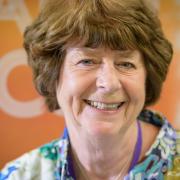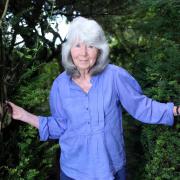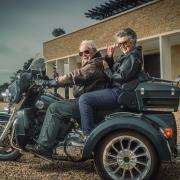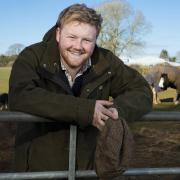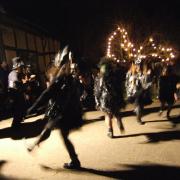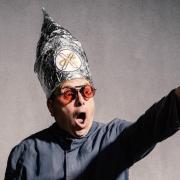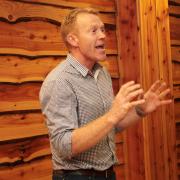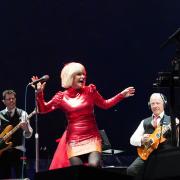Lisa Maxwell was lured to the depths of rural Gloucestershire after visiting fellow-actress friend Emma Samms. Katie Jarvis talks to the comedienne, actress and presenter about falling in love with her 17th century Cotswold home
Lisa Maxwell is in love. Utterly, completely bewitched. You can see it in the way her eyes assume a far-away look, her voice softens, and her mouth tilts up at the corners. The object of her affection is a little older than you might imagine; certainly scruffier; and (if truth be told) smells slightly musty.
But there’s solidity there; dependability; and more than a hint of once-glorious looks. And nowadays, those are exactly the sorts of qualities she’s after in a life-partner.
"It’s taken Paul and me four years to find this house," Lisa beams. "In fact, I’ve developed personal relationships with all the estate agents in the area! The first time we saw it, it was out of our price range and it needed a lot doing to it. But we both said, ‘Whoever gets that house is going to have one special home’."
Eighteen months later, this 17th century Cotswold-stone manor near Stroud came back on the market and, last October, the couple managed to snap it up at a price they could afford. If you’re a cup-half-empty sort of person, you’d reach for the Valium at the thought of the amount of work needed to do up its stately nine bedrooms and palatial downstairs living rooms; if you’re cup-half-full, you’d marvel at its sheer rarity value: an untouched Cotswold gem that you’re free to sculpt into your dream shape.
Kenny Everett, who routinely gave God marks out of 10 for landscapes, would have awarded a Double First to the Almighty for the view out of the windows. It’s as if someone has proclaimed, "We want no signs of the 21st century here!" and swept up everything that’s not field or farm or furrow. And then there are the grounds: seven acres of wild meadow, striped formal lawn, tumbling pastel-hued flowers, and kitchen garden complete with walnut tree. (They may not have been decorators, but the family who owned and loved it before were superb landscape gardeners.)
We look around larders pierced with old meat-hooks, pokey servants’ stairs, a myriad rooms with 50s wallpaper, and the sort of ancient, rambling Aga that Adam might have bought Eve for their first post-Eden home.
It’s going to look very different by the time Lisa, her partner Paul, and their 11-year-old daughter Beau move in at Christmas. "We have fairly contemporary tastes but there will be an element of the traditional because this house has its own voice that we’re listening to," she says. "Paul used to have an interior design company so he has strong ideas, but I’m hoping this will be the first house where the things I choose don’t end up in the cellar! I buy things, forget about them, and then come across them a bit later, carefully stowed away in a dark corner by Paul."
Ask her why she moved from the buzzing streets of London to this one-car-wide-if-you’re-lucky corner of Gloucestershire, and Lisa Maxwell will explain she was lured here after visiting fellow-actress friend Emma Samms (which, as anyone who knows the lovely Emma will tell you, is perfectly feasible). And that, despite being brought up in a second-storey council flat in Elephant and Castle, she feels more at home in the country: "As soon as I get into the village, my shoulders start to come down from around my ears," she says, with evident relish.
And yes, yes; we can see all that. But there’s something else. For Lisa Maxwell, comedienne, actress, long-time star of The Bill, ITV Loose Women chat-show favourite, is at a different place in her life, not just geographically but metaphorically, too.
Lying on the table in front of us, in the echoingly empty dining room, is Lisa Maxwell’s hot-off-the-press autobiography, Not That Kinda Girl, funny, touching and full of intimate details about her South London childhood: bawdy songs in smoky pubs, and high-rise flats where the only gangs were children playing hide-and-seek. Everyone wants to talk to her about it – in fact, she’s psyching herself up for a live appearance, in just over 24 hours’ time, on the Paul O’Grady Show. And not just any Paul O’Grady Show... She’ll be on the sofa alongside Janet Jackson and Bob Geldof.
"It’s a funny old life, I lead; it really is," she muses. "I was lying in bed last night, thinking about the fact that I could be sitting on that sofa, talking about my Nan from the Elephant, next to Michael Jackson’s sister. Just surreal."
She’s exactly like her warm, bubbly Loose Women persona. So much so, it’s tempting to slip into the show’s chatty, coffee-with-girlfriend format – what does she think about pushy parents, Botoxed beauties, sex and seniors? But we’re here to talk about something else; about the hidden side of Lisa Maxwell that her book reveals. The ghost – as she herself puts it – that has haunted her all her life… And that ghost is her illegitimacy.
In 21st century Britain, where nearly half of all children are born to non-married couples, it’s hard to imagine the devastating impact that would have had on a child growing up in the Sixties. Indeed, her earliest memory is the hysteria she felt as a three-year-old, seeing her mum go out on a date: ‘"She’s with a man, she’s with a man!’ I was yelling…" A man – any man – meant danger. "Even then, too young to understand it properly, I had taken on board so much of the shame of being born out of wedlock…"
Her father – whom she only met two years ago – was a young Irish Catholic whose wife was already expecting. Her 22-year-old mum, Val, had no idea he was married – she was deeply in love with this young Paul Newman lookalike she considered to be her boyfriend. By the time Val confessed to her parents, her suitcase was packed for the local baby home and Lisa was one night away from being adopted; hers was a last-minute reprieve. It was 1963, and the hypocrisy of the situation is not lost on Lisa. "My mum was from London, where the Swinging Sixties were supposed to be happening – but they weren’t really happening at all. They were a romantic notion that women could be free and carry on in the way men did."
It was thanks to Lisa’s ‘nan’ – one of the stars of the book – that Val was allowed to keep her child, despite Lisa’s granddad – a council road-sweeper – initially going ballistic. But the occasion marked not just the birth of a child: it was equally the birth of a whole roost of half-truths and fictional notions concocted to hide an unpalatable reality; stories that explained away the shame: ‘My dad is dead’; ‘My dad left when I was very young’.
So far so bad. But the circumstances of Lisa’s birth gave another, more positive twist to her life, for they laid the foundations for her love of performing. Her talent was evident from the age of six when Miss Stokes, the singing teacher, gave her her first solo, in a Peter Rabbit production. As far as Lisa was concerned, performing meant attention was diverted away from the more mundane aspects of life: "If I was funny and popular, who would care if I didn’t have a father," she writes.
When she was eight, her mum enrolled her in the Italia Conti theatre school’s Saturday speech and drama lessons, mainly so she could ‘talk proper’ and be in with a chance of marrying Prince Andrew – her mum’s main ambition for her at the time. She absolutely thrived in the atmosphere; three years later, she was offered a full-time place, paid for by a desperately-sought loan her mum secured from work, and clothed by the kindness of people such as Bruce Forsyth’s first wife, who passed down school uniform from her own daughter.
Later that year, her career began in earnest: Lisa secured a part in the TV show Ballet Shoes, based on the Noel Streatfeild novel. It was clear from the off that she’d found her niche in life – she thrived on performing on stage or in front of a camera. As always, though, there was trouble lurking in the wings. Because of child labour laws, birth certificates had to be produced. It was a moment she always dreaded: "I couldn’t bear seeing someone else’s eyes reading ‘Father Unknown’ – it made me feel physically sick," she recalls.
Italia Conti (for years called Italian Conti by her mum) produced some tremendous talent. Lisa found herself in class alongside other child stars such as Lena Zavaroni, already famous yet one of the quietest pupils there. Another was the far more self-assured Bonnie Langford, her bright red hair ‘teased into a million ringlets’. On the plus side, the school was classless; talent was the only passport to fame.
On the minus side, the concentration on looks and weight was relentless. At just 13, Lisa was called into the principal’s office and told to eat more carefully. "I’m not blaming the school for Lena’s anorexia (as a result of which she died in her 30s)" she writes; "but it’s easy to see how any girl might slip into an eating disorder."
The romp through the subsequent career that Not That Kinda Girl details is a fabulous showbiz read. There was her part in the Jim Henson film, The Dark Crystal; her appearances on The Russ Abbot Show, which led to her own brief BBC series; her moment of near-Hollywood fame when she narrowly missed getting the part of Daphne Moon in Frasier through a series of misunderstandings; and her seven-year stint as Detective Inspector Samantha Nixon in ITV’s The Bill.
She made the decision to leave the popular police drama in 2009 after suffering two miscarriages. "After I gave her up, I was a lot less aggressive. When you’re playing a figure of authority six days a week, 14 hours a day, it’s really difficult to come home and surrender to the passive, happy family life that’s waiting for you behind the door. Whenever I was being driven home after work, I’d be issuing orders the whole time – ‘Straight on; don’t go that way, go this way’ – a control freak in the back of the car. It was like I was on a bloody raid!"
She gives herself no slack at all in the telling of her life story-so-far. Problems with eating disorders, money, alcohol and relationships are relayed in undramatic, disarmingly honest fashion. And all against the background of her struggle to come to terms with the circumstances surrounding her birth.
There are plenty of laughs, of course; and some wonderful characters shine through the narrative, particularly her feisty nan, who deserves a book in her own right. "She was very typical of women from that generation, whose husbands went off and drank a lot and maybe had a gamble. Those Cockney women, who kept the family going, are a dying breed. You could go into a pub and know exactly where they’d be sat with their bag of crisps every Friday night.
"I said to Paul the other day, ‘Mark you, let’s be fair’ and he said, ‘Why are you talking like that? You sound like a suffragette!’ But it’s because my nan used to talk like that. Since she passed away, I think I’m unconsciously looking for all her funny sayings as a way of hanging on to her."
What’s also very clear throughout the book is the way Paul and their daughter, Beau, have allowed her to accept the past and move securely and confidently into the present. It was Paul who helped her track down her father in 2010. She was surprised at how much the encounter meant to her and, although they don’t see each other a great deal, the relationship is developing.
But it’s Beau, particularly – the daughter she adores – who’s been the inspiration for the book. "The biggest thing for me is to be able to say to Beau: ‘Here it is. It’s not great but it’s the truth’. I just wish, when I was confronted with the most profound pieces of information you can give a child, that my mum had been brave enough to actually say, ‘Look, it’s **** but this is what it is and we’ll be fine’. However, she had very little self-esteem and self-confidence because of the general reaction to her, so she blotted out uncomfortable truths and I understand that now.
"But," she adds, with characteristic pragmatism, "I honestly believe that, if things had happened differently, I wouldn’t be as happy and living such a charmed existence as I do."
She’s enjoying Loose Women – especially as it means she can get back in time to pick up Beau from school. And while, in an ideal world, she’d like a regular job in a soap not too far from home, she’s taking life in her stride. Because the most important things right now are her family and the new home in Gloucestershire that she adores. Which is a million miles from showbiz life…
Well, sort of. "I’ve just found out our gardener was a stunt double for Richard Gere in First Knight," she giggles. "I don’t know! Our postman’s going to turn out to be a stand-in for George Clooney in ER or something. It just keeps getting better."
Not That Kinda Girl by Lisa Maxwell is published in hardback by Harper Collins, price �16.99.



